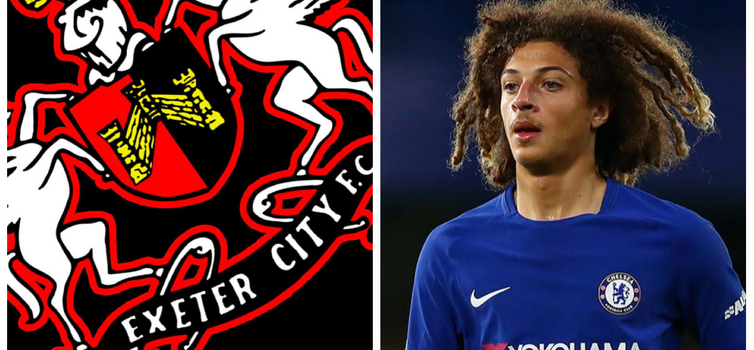Why Exeter City is the Devon talent factory

Ethan Ampadu moved from Exeter to Chelsea at the age of 16
Written by Dan Kelly — January 30, 2018
ETHAN AMPADU’S breakthrough into both the Chelsea and Wales teams has placed him in the global spotlight.
The 17-year-old is also the flag-bearer for a group of Exeter City graduates now plying their trade across the UK’s top divisions. Ollie Watkins is at Brentford, former England Under-20 skipper Matt Grimes is at Swansea City and Sean Goss is on loan at Glasgow Rangers.
Club captain Jordan Moore-Taylor and first-choice goalkeeper Christy Pym are other Academy graduates, while Dean Moxey and Dan Seaborne have returned to the club after spells at Premier League clubs.
These successes are testament to the club’s work in producing players capable of playing at the highest levels.
Opportunity knocks
Exeter has established itself as an ‘opportunity club’, where youngsters are afforded a chance in senior football once they are ready.
Ampadu, for example, played in League Two, the FA Cup and League Cup during the 2016/17 season, having become the youngest first-team player in the club’s history at just 15 years, 10 months and 26 days.
George Friend had more than 40 games under his belt in a combination of the Conference and League Two before joining Wolves at the age of 20. Watkins had scored 26 goals by the time he moved to Griffin Park, while Grimes had made 58 first-team appearances when he moved to South Wales. Both were only 20.
This is clearly a club that gives you a chance if you’re good enough, no matter what your age. Some may argue this is borne out of necessity, because of the limited resources available to a club 100% owned by the Supporters’ Trust.
Relegated to the Conference in 2003 and staring administration in the face, the Supporters’ Trust was formed, ensuring that the long-term interests of the club always came first. The promotion of young talent from the Academy allows for a self-sustaining first team squad and for money to be raised from the sale of homegrown players.
Any fees received are re-invested in the football club to ensure continual improvement and progression. The model makes perfect sense in an industry threatening to suffocate itself with transfer fees and wage demands.
Environment
With modest funds and humble (although improving) facilities, culture and environment are key in attracting and retaining both players and parents.
A family feel transcends the whole of the club, from first team to Academy to community department, with players, parents, coaches, visitors and opposition all made to feel welcome.
Within the Academy, enjoyment, education and life experiences are all placed above football performance. Statistically, 95% of players within an Academy system will not become professionals, so Exeter takes its responsibility to look after the welfare and long-term opportunities of players who come through the door very seriously.
Players are given ownership of their learning and supported by the football and operations staff. Continuity amongst staff further enhances the relationship between coaches, players and parents.
READ MORE: The graduates' verdict
The manager, Paul Tisdale, is currently in his 12th season at the helm. Chairman Julian Tagg was previously a coach within the youth section, whilst Spurs legend Steve Perryman has operated as Director of Football since the early 2000s.
Recently-departed Academy manager Simon Hayward helped bring through players for more than a decade.
Following his departure, Arran Pugh, himself a former youth player and Academy coach at the club, stepped into the role as Operations Manager. Wayne Carlisle, a previous promotion winner with Exeter, oversees the Academy coaching programme.
Coaches are key
Exeter have been blessed with some excellent coaches throughout recent years.
The record of the late, Eamonn Dolan (below), who was Academy manager at both Exeter and Reading, is up with there with the very best in world football. In addition, three previous Under-18 coaches have gone on to prominent jobs, showing that Exeter are strong at identifying coaching as well as playing talent.

Kwame Ampadu - Ethan's father - moved to Arsenal in 2012 after four years with The Grecians and is currently the Gunners’ Under-18s coach. His successor, Kevin Nicholson, became Cardiff City’s Under-23 manager and then their first team coach and is now manager of Welsh Premier League side Bangor City.
Then Lee Skyrme joined The FA as an in-possession coach for the Under-18s and was part of the backroom staff for the World Cup-winning England Under 17s last summer.
His replacement at Exeter was Dan Green, a former club scholar, who is just 26. With seven first-team debuts and two league titles in two years, Green looks likely to follow in the footsteps of his predecessors.
Well-rounded young men
For every young player who makes it as a pro, of course there are many who don’t get there.
So Exeter stress the importance of helping to form well-rounded young men.
Education is regarded as being more important than football, as is maintaining a healthy and happy home life and taking responsibility for your own learning and behaviour. The club hopes this not only provides a solid foundation in football, but in life in general, no matter what career path these young men choose.
Who knows, some of them could even return to the club in the future to inspire the next Ethan Ampadu.
- Dan Kelly is Head of Academy Recruitment at Exeter City.






-1.png)





